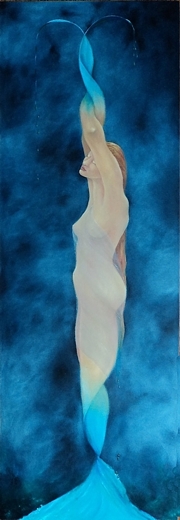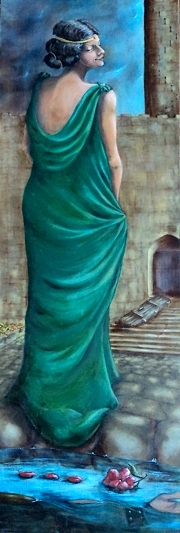|
Ovid’s WomenOvid completed his Metamorphoses, or Transformations, in 8 CE. It is a collection of Greco-Roman myths emphasizing human fragility and naiveté when faced with the irrational whims of deities. It particularly relates stories of the insubstantiality of human form. And, of course, women are the usual victims of divine fiat. Daphne is turned into a tree, Byblis transforms into water. On their side the gods could claim innocence—mankind called out to them for help. However, The Metamorphoses proves the adage “Be careful what you ask for.” Ovid’s magnificent collection certainly is much more than a mere listing of transmogrifications. It is poetry that soars almost beyond human understanding, and is, in fact, a great paean to the heroes, heroines, gods and goddesses of that time. |
|
Atalanta And The Golden ApplesAtalanta, the daughter of the king of Boeotia, tested her suitors’ worthiness by challenging them to a foot race. If they won, they had a crown; if they lost, they were executed. And they always lost to the swift footed beauty. Young Hippomenes, great grandson of Neptune, used another avenue to success. He called upon Venus, the goddess of beauty, to instruct him in winning the elusive Atalanta. She gave him three golden apples to place along the designated path. These, she said, would tempt Atalanta to stray from the race to collect them, thus slowing her down. All transpired as Venus had said, except that even with her diversion from the course, Atalanta was about to win the race. Intrigued now, however, by her suitor’s lineage, beauty and resourcefulness, she succumbed to the temptation of the last golden apple and happily allowed Hippomenes to win the race. |
 |
| |
|
The Transformation Of Byblis
The princess Byblis fell passionately in love with her brother, a forbidden union. Her pursuit was so hot that the hapless brother fled his home and founded a city elsewhere. Byblis was bereft. Senselessly she wandered, telling her story to all who would listen, reviling the Fates, praying to Bacchus. At last she fell, able to go no further. There she tore at the earth and wept herself dry until the Naiads, taking pity, cooled her with more liquid in her veins. Her endless tears finally became a fountain and a stream, and she melted into the earth, nothing but pure water.
|
 |
| |
|
Hecuba Contemplates
|
 |
| |
|
|
Home | Hawaiiana | Flora | Fauna | Dancers | Illustrations | Portraits | Maps | Still Life | This & That | Contact Copyright 2013 - Elizabeth Ashley - All Rights Reserved |
|